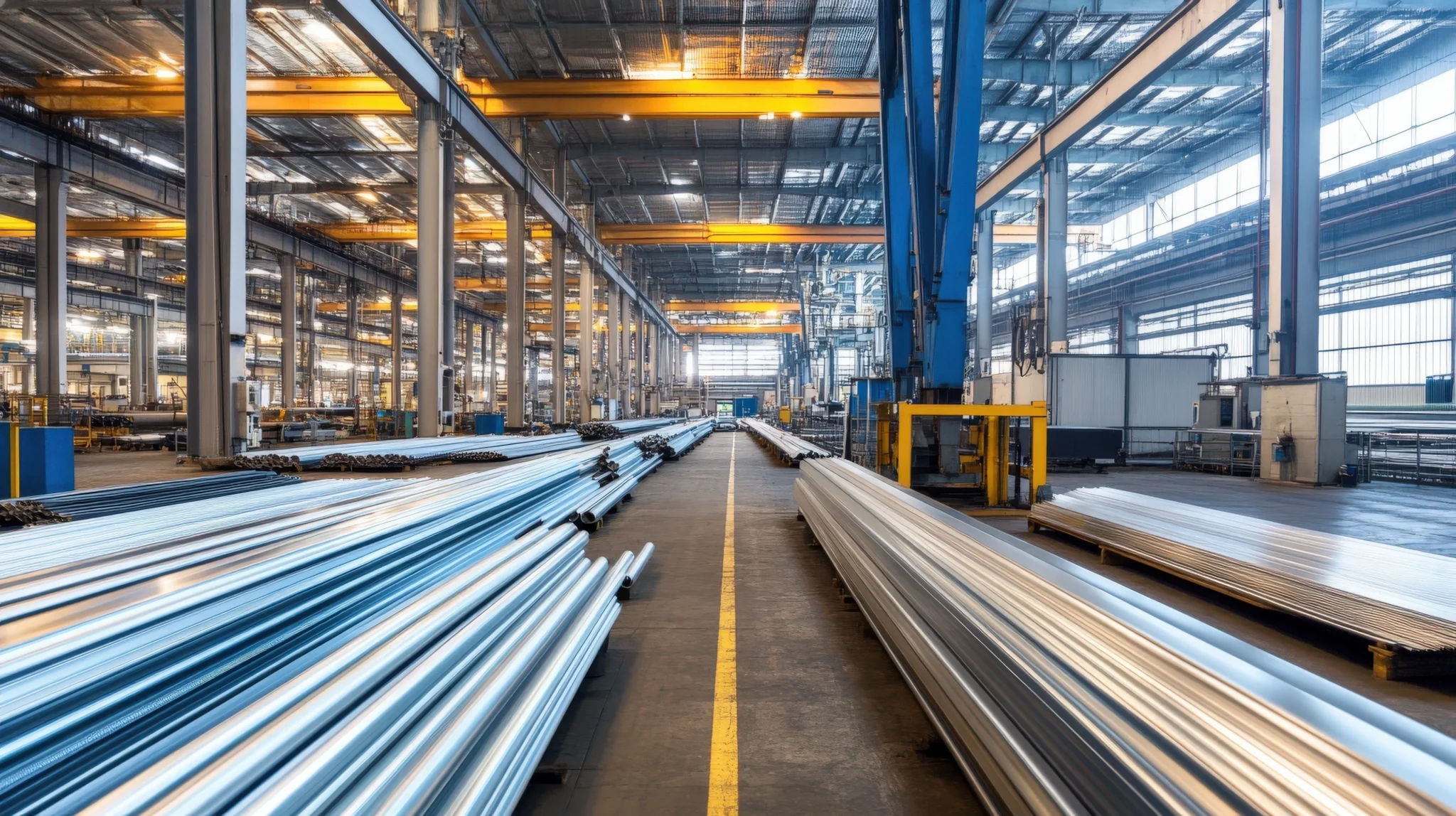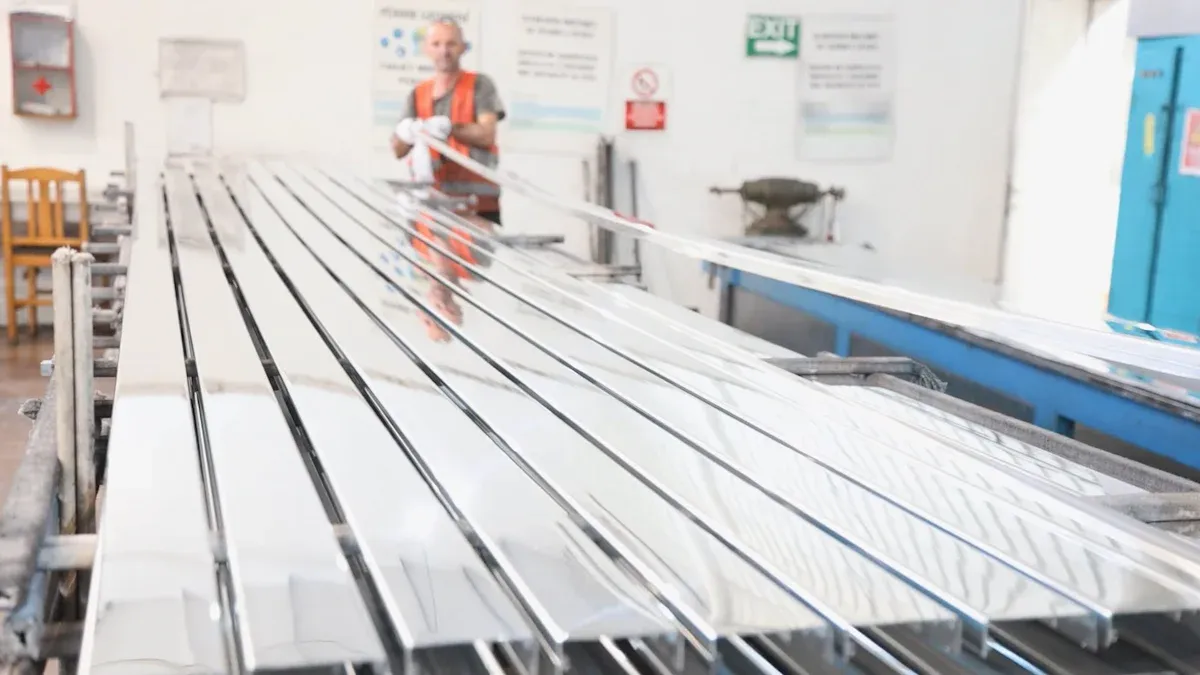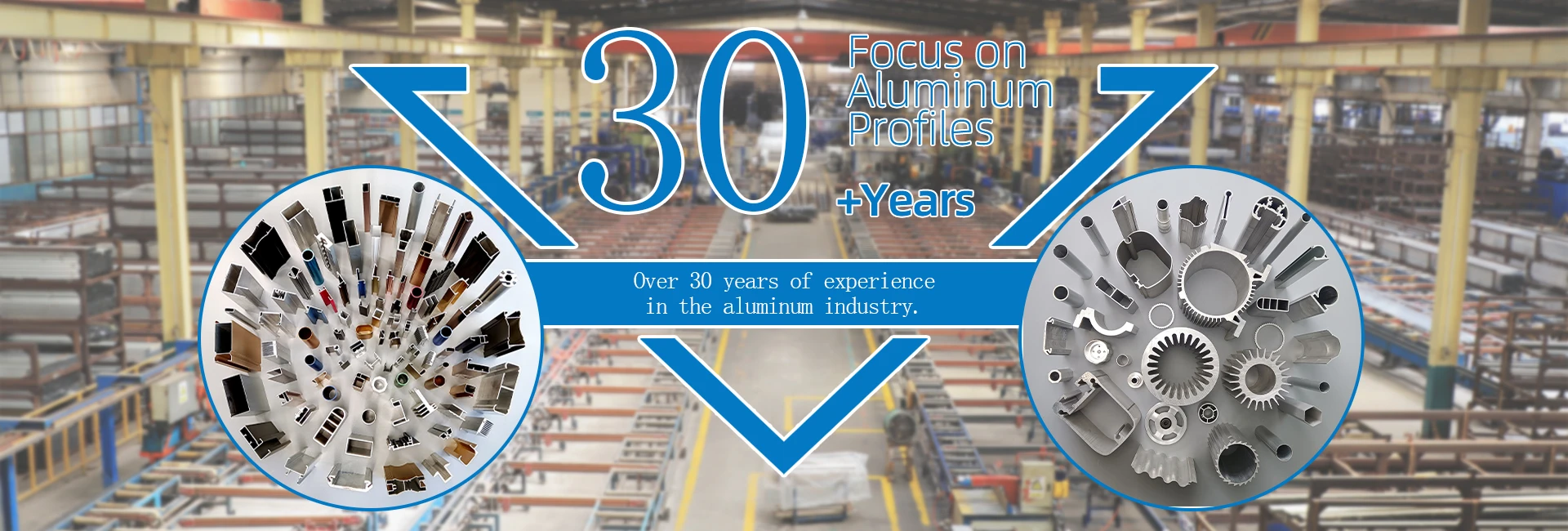
Aluminum product customization is revolutionizing industries with its versatility and practicality. It plays a crucial role in sectors such as construction, transportation, and renewable energy. Through aluminum customization-supplier services, industries can create lightweight, durable components tailored for specific applications. For example, customized aluminum frames in sustainable buildings enhance energy efficiency and reduce waste. In the automotive sector, lightweight aluminum improves the performance of electric vehicles. Many of the top-10-aluminium-extrusion-companies are adopting advanced technologies like robotics and recycling to maintain eco-friendly practices. These innovations solidify aluminum’s importance in modern manufacturing and design.
Key Takeaways
Custom aluminum products are made to fit specific needs. They improve how things work and make them more useful.
Aluminum is light but strong, perfect for cars and planes. It helps them perform better and use less fuel.
Making aluminum uses eco-friendly methods, cutting waste and saving energy. This helps the planet and saves money too.
Aluminum can be used in buildings, green energy, and everyday items. This shows how useful and important it is today.
Using aluminum is good for the Earth because it can be recycled. It also saves energy, making it great for future ideas.
What Is Aluminum Product Customization?
Definition and Characteristics
Designs Made for Special Industrial Needs
Custom aluminum products are made to fit specific needs. This process creates unique shapes and sizes not possible with regular methods. For example, custom extrusions shape aluminum by pushing it through a mold. This allows for detailed designs, stronger structures, and less wasted material. It also supports modern goals like being eco-friendly.
Light but Strong Material Features
Aluminum is both light and strong, making it very useful. It works well in industries like cars, planes, and buildings. Light parts save energy, and strong parts last longer. Choosing the right aluminum type, like 2XXX or 7XXX for strength, improves its use. Finishes like anodizing or powder coating make it tougher and look better too.
Why Aluminum Is the Best Choice
Strong and Lightweight
Aluminum is strong but doesn’t weigh much, which is important. It’s great for things like electric cars and airplanes. It’s easier to shape than materials like titanium. This mix of strength and lightness helps industries work better and faster.
Resists Rust and Can Be Recycled
Aluminum doesn’t rust easily, even in tough conditions. When mixed with other metals, it resists rust even more. It’s perfect for things like solar panels and boat parts. Aluminum can also be recycled using very little energy. This makes it cheap and good for the planet.
Importance in Modern Manufacturing
Precision and Speed
Industries today need accurate and fast production. Custom aluminum parts meet these needs by being made to exact sizes. Special designs, like hollow shapes, make parts strong but light. This helps save fuel in vehicles and speeds up production.
Eco-Friendly Production
Making aluminum products uses less material and creates less waste. Processes like extrusion and rapid prototyping are efficient and eco-friendly. This saves money and helps the environment, making aluminum a smart choice for big factories.
Key Benefits of Aluminum Product Customization
Design Flexibility
Ability to create complex shapes and sizes
Custom aluminum parts allow for creative and unique designs. You can make detailed shapes and sizes for specific needs. For example, aluminum extrusions help form special profiles for complex parts.
In aerospace, companies like Boeing use aluminum prototypes for lightweight brackets. These designs save fuel and meet strict rules.
This flexibility makes aluminum great for marine uses, like railings and structural parts. It works well for both looks and function.
Customizable surface finishes for aesthetics and functionality
Aluminum can have finishes that improve its look and use. Options like anodizing protect against rust and add shine. These finishes work for furniture, lamp shells, and electronics. Whether you need style or strength, aluminum is a good choice.
Material Efficiency
Lightweight properties reduce energy consumption
Aluminum is light, which helps save energy. In transportation, lighter parts mean vehicles use less fuel. Electric cars benefit from aluminum trays and radiators that save energy and work better.
Cost-effectiveness in production and transportation
Making aluminum parts in large amounts lowers costs. Sharing mold expenses across many pieces saves money. Using raw materials wisely also reduces waste and costs.
| Manufacturing Process | Typical Tooling Cost |
| Aluminum Extrusions | $500-$5,000 |
Efficient cutting and software tools improve production. This makes aluminum an affordable option for industries.
Cross-Industry Applications
Versatility in adapting to diverse industrial requirements
Aluminum works for many industries. It’s used in construction for doors and windows, and in energy for solar frames. Its flexibility fits the needs of different sectors.
Enhancing product performance and longevity
Custom aluminum parts last longer and work better. Aluminum resists rust, making it great for outdoor items like guardrails. Its strength keeps products reliable over time.
| Metric | Description |
| Design Flexibility | Aluminum can be shaped to fit many design needs. |
| Material Efficiency | Using recyclable aluminum shows care for resources. |
| Sustainability | Aluminum supports energy-saving and eco-friendly solutions. |
Choosing aluminum means using a material that helps industries innovate and stay efficient.
The Process of Aluminum Product Customization

Image Source: pexels
Material Selection
Picking the best aluminum alloy for each use
Choosing the right aluminum alloy is very important. Each type has special features for different jobs. For example, 6XXX alloys are strong and resist rust, making them great for doors and walls. In airplanes, 7XXX alloys are strong and lightweight. For electric car battery trays, 3XXX alloys work well. These alloys can be adjusted to fit needs in medical tools or machines.
Finding the right mix of strength, weight, and cost
You need to balance strength, weight, and cost when picking alloys. Light alloys save energy in cars and solar panels. Strong alloys last longer in tough conditions. Cheaper alloys, like 1XXX, are good for simple things like furniture or lamp frames. By balancing these, you can make aluminum products that work well and save money.
Surface Finishes and Treatments
Anodizing for protection and better looks
Anodizing makes aluminum stronger and look better. This process adds a protective layer that stops rust and adds color. For example, anodized aluminum is used in electronics and furniture because it looks nice and lasts long. It’s also used in solar frames and curtain tracks to make them stronger and last longer.
Powder coating and other finishes for durability
Powder coating gives aluminum a tough, smooth finish. It doesn’t chip or fade easily, so it’s great for things like mirrors and railings. Other treatments, like roughening the surface, make aluminum stronger for heavy machines. These finishes help aluminum work well in different environments and uses.
Manufacturing Techniques
Extrusion, casting, and CNC machining
Extrusion shapes aluminum by pushing it through a mold. This is used for walls, belts, and machine frames. Casting makes detailed parts like brackets, and CNC machining creates precise parts like radiators. The steps include heating, shaping, cooling, and cutting, as shown below:
| Step | Description |
| 1 | Heat aluminum billets in an oven. |
| 2 | Push the hot metal through a mold under pressure. |
| 3 | Shape the aluminum into the needed form. |
| 4 | Cool the shaped metal on a long table. |
| 5 | Cut the metal to the right size. |
| 6 | Heat treat the aluminum to make it harder. |
| 7 | Create custom molds to improve use and stop rust. |
| 8 | Add features to reduce extra work later. |
| 9 | Include ribs or grooves for strength and style. |
| 10 | Work with designers to make it better. |
Checking quality and using precise tools
Careful checks make sure aluminum parts are made correctly. Tests like looking for cracks or measuring sizes ensure quality. Special machines help make parts faster and with less waste. Using tools to track the process keeps standards high. This makes aluminum products reliable for many industries.
Applications of Custom Aluminum Products Across Industries

Aerospace
Lightweight parts for saving fuel
In aerospace, lighter parts help save fuel and money. Custom aluminum parts are key to making this happen. They are light, so planes use less fuel and are better for the planet. For example:
Aluminum is strong and light, perfect for plane parts like wings.
Extrusion makes durable, lightweight materials that lower plane weight.
New aluminum alloys make it even more useful in planes.
These improvements have increased the use of aluminum in planes as companies focus on saving fuel and being eco-friendly.
Strong alloys for safe structures
Planes need materials that stay strong in tough conditions. High-strength aluminum alloys, like the 7XXX series, are perfect for this. They are very strong but not heavy. This makes them great for important parts like landing gear. Custom aluminum helps engineers make safer and better planes.
Automotive
Special parts for electric and hybrid cars
Car makers use custom aluminum to build electric and hybrid cars. Light aluminum frames and battery trays help cars go farther and use less energy. For example:
A top electric car company improved performance by using aluminum instead of steel.
Custom aluminum radiators keep batteries cool and working well.
This switch to aluminum shows the car industry’s focus on eco-friendly designs.
Improving safety and driving
Aluminum also makes cars safer and better to drive. It absorbs crash energy, making it good for safety parts. Custom aluminum parts also improve how cars move and handle. These features make aluminum a must-have for modern cars.
Consumer Goods
Stylish and strong designs for gadgets and appliances
Aluminum is tough and looks good, changing how gadgets and appliances are made. It’s used in electronics and appliances for sleek, useful designs. Research shows:
| Segment | Description |
| Electrical & Electronics | Third-largest user of aluminum in phones, laptops, and appliances. |
| Advantages of Aluminum | Stronger than plastic, lighter than steel, widely used. |
| Market Drivers | Growing demand due to more people, better living, and replacing old appliances. |
These features make aluminum a top choice for making durable and stylish products.
Eco-friendly packaging options
Aluminum is light and recyclable, making it great for green packaging. It keeps items safe while helping the environment. From soda cans to makeup containers, custom aluminum packaging meets the need for eco-friendly choices.
Construction and Renewable Energy
Aluminum Frames and Panels for Green Buildings
Aluminum is important for making eco-friendly and energy-saving buildings. It is light and strong, perfect for walls, façades, and supports. Using aluminum frames lowers the weight on building foundations but keeps them strong. Rust-proof aluminum windows and doors need little care, saving time and money.
Recycling aluminum makes it even better for green construction. Many architects use aluminum in designs to cut emissions and costs. For example, National Industries creates custom aluminum for eco-friendly buildings. Whether for modern walls or energy-saving designs, aluminum is a flexible and green choice.
| Application Type | Benefits |
| Curtain Walls and Façades | Strong, flexible, and looks great. |
| Structural Support Systems | Light and strong, reduces foundation weight. |
| Windows and Doors | Rust-proof and easy to maintain. |
| Energy-Efficient Structures | Helps lower emissions and saves money. |
Components for Solar Panels and Wind Turbines
In renewable energy, aluminum is key for solar panels and wind turbines. Its light weight makes moving and setting up easy. Aluminum also lasts long, helping solar panels work better. It handles bad weather, so it’s great for wind turbine parts.
Aluminum is strong and recyclable, making it ideal for green energy projects. Solar panel frames made of aluminum give great support. Wind turbine parts resist rust, lasting a long time. Choosing aluminum helps create cleaner, greener energy systems.
Aluminum is used more in energy-saving building designs.
Its strength and recycling ability make it a top choice.
National Industries offers custom aluminum for green designs.
Aluminum’s use in construction and renewable energy shows its power to change industries. Whether for eco-friendly buildings or better energy systems, aluminum is efficient and sustainable.
Custom aluminum products are changing industries with their flexibility and usefulness. They are important in areas like building, transportation, and clean energy. These products help improve how things work and make them eco-friendly. For example:
Light makers use custom aluminum to build LED lights that save energy.
Car companies use lightweight aluminum to save fuel and cut pollution.
Builders use strong, energy-saving materials to create greener buildings.
As industries grow, custom aluminum will stay key to solving problems and moving forward.
FAQ
What industries use custom aluminum products the most?
Custom aluminum is used in construction, transportation, and electronics. It’s found in windows, car parts, and electronic coolers. It’s also key for renewable energy, furniture, and medical tools.
Why is aluminum better than other materials?
Aluminum is strong, light, and doesn’t rust easily. It’s recyclable, so it’s good for the planet. It can be shaped for planes, buildings, and machines.
How does customizing aluminum make products better?
Custom designs help aluminum meet special needs. For example, light battery trays in electric cars save energy. Coated aluminum walls last longer and look nicer.
Can aluminum be made for special uses?
Yes, aluminum can be shaped for many things. You can design it for solar frames, machine parts, or lamp covers. This makes it fit your exact needs.
Are custom aluminum products eco-friendly?
Yes! Aluminum can be recycled and uses little energy to make. Choosing custom aluminum helps save resources and cut waste in industries like building and transport.

